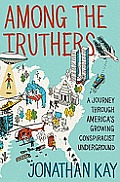Among the Truthers: A Journey Through America's Growing Conspiracist Underground
Among the Truthers: A Journey Through America's Growing Conspiracist Underground
Publisher Comments:
From left-wing 9/11 conspiracy theorists to right-wing Obama-hating "birthers"—a sobering, eyewitness look at how America's marketplace of ideas is fracturing into a multitude of tiny, radicalized boutiques—each peddling its own brand of paranoia
Throughout most of our nation's history, the United States has been bound together by a shared worldview. But the 9/11 terrorist attacks opened a rift in the collective national psyche: Increasingly, Americans are abandoning reality and retreating to Internet-based fantasy worlds conjured into existence out of our own fears and prejudices.
The most disturbing symptom of this trend is the 9/11 Truth movement, whose members believe that Bush administration officials engineered the September 11, 2001, terrorist attacks as a pretext to launch wars in Afghanistan and Iraq. But these "Truthers" are merely one segment of a vast conspiracist subculture that includes many other groups: anti-Obama extremists who believe their president is actually a foreign-born Manchurian Candidate seeking to destroy the United States from within; radical alternative-medicine advocates who claim that vaccine makers and mainstream doctors are conspiring to kill large swathes of humanity; financial neo-populists who have adapted the angry message of their nineteenth-century forebears to the age of Twitter; Holocaust deniers; fluoride phobics; obsessive Islamophobes; and more.
For two years journalist Jonathan Kay immersed himself in this dark subculture, attending conventions of conspiracy theorists, surfing their discussion boards, reading their websites, joining their Facebook groups, and interviewing them in their homes and offices. He discovered that while many of their theories may seem harmlessly bizarre, their proliferation has done real damage to the sense of shared reality that we rely on as a society. Kay also offers concrete steps that intelligent, culturally engaged Americans can take to reject conspiracism and help regain control of the intellectual landscape.

More:
http://www.powells.com/biblio/1-9780062004819-0
LeftishBrit
(41,442 posts)though I would disagree that this is a new phenomenon. Look at Richard Hofstadter's great article of 1964, 'The Paranoid Style in American Politics' and in the 50s, the political system was for a while taken over by the conspiracy-theory of McCarthyism.
British politics tends not to show this in quite such an extreme form, but the tabloids have marketed some fairly strong CTs; and the far-right groups such as BNP, EDL and to some extent UKIP indulge in a paranoid style.
I would say that the Internet makes it easier for such theories to spread; and that the economic crunch encourages them.
frankie
(53 posts)When I'm feeling fuzzy-headed, I read this stuff and it reminds me how very comfortably grounded I am.
[link]http://educate-yourself.org/[/link]
dmallind
(10,437 posts)Just found a new lodestone.
From Donnelly's Atlantis to Von Daniken's alien gods to the Elders of Zion and the Templars and the Illuminati and the Masons (the Republican party was a spin-off from anti-Masonic conspiracy nuts) there hasn't been a time when a fairly significant number of Americans weren't convinced that some secret cabal knew all and guided all. Every so often an event or work sparks a new or resurgent focus - be it Dan Brown or 9/11.
It's not a uniquely American concept but it is far worse here than in other OECD countries. Dunno why. Maybe the endemic distrust of actual academic knowledge. Maybe the somewhat outre associations of some of the founding fathers. Maybe the political system that splits up real state power and seems to make room for some unitary shadowy string-pulling. But in American cultre it's the equivalent of the spacy and hapless yet somehow endearing aged uncle at family events - both embarrassing and strangely comforting.